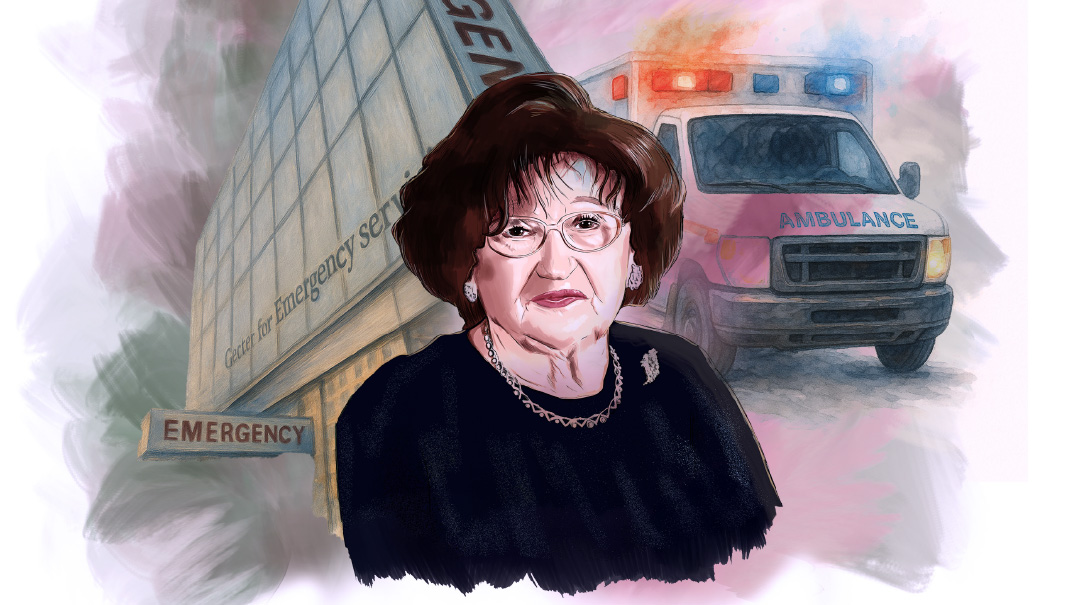My Brother’s Keeper

The reality of caring for an adult sibling with special needs

When I reached out to speak with Libby about her role in caring for her brother with severe mental illness, she couldn’t really talk. Her brother, David, was being evicted from his apartment, and the family was in crisis mode.
Every visit to help him clear out his apartment and manage related details necessitated a four-hour round trip from her hometown to his, and she and her sister were falling apart.
David is in his seventies.
As stigma surrounding mental and physical illness dissipates, many adults with handicaps who might formerly have been shut away in institutions are being supported in more independent living arrangements and welcomed, to the extent possible, into the community.
Additionally, a rising tide lifts all ships, and as medical advances continue to extend lifespans, they also increase the life spans of the developmentally delayed and physically handicapped populations. An entire generation of adults with special needs, who in previous generations wouldn’t have outlived their parents, are now the charges of their siblings.
Even when the sibling with special needs is safely cared for in a group home, medical decisions, financial planning, and general loving family care all remain the responsibility of their siblings.
It’s the sandwich generation squared — not only are they caring for aging parents and the demands of their children, they’ve also got a sideways pull from a sibling with complex physical and emotional needs.
Great Expectations
For better or for worse, many siblings realized early on that they would ultimately be left holding the bag of their special-needs sibling’s care. “I can distinctly remember being in elementary school, and thinking to myself, ‘How will I ever be able to take care of him?’” recalls Libby.
Leah, whose sister Judy also struggles with a significant mental health issue, similarly found it difficult to come to terms with her role. “When I was first married, I’d have to take care of Judy if my parents went away. I didn’t always want to. Sometimes she’d be upset or throw things,” she remembers. “There was also the guilt when we first found out she was ill — did I pick on her too much when we were kids?”
While a feeling of despair is all too common, others used the knowledge of what was to come as a spur to action.
Dr. Rosanne Superstein, a pediatric ophthalmologist in Montreal, knew from a young age that she’d ultimately be responsible for her brother, Andrew. Three years her junior, Andrew suffers from Angelman syndrome, and functions cognitively as a two-year-old, but in an adult body.
“When I was young, I was naive, and I thought I’d get married and have a little house in my backyard for my brother,” she relates. “When I was in medical school, I was busy, but you always figure things will calm down eventually. Now I have three kids, and I’ve learned that life only gets busier.”
With an eye toward the future, Dr. Superstein took a proactive approach, and encouraged her parents to seek respite services at Benjamin & Vanda Treiser Maison Shalom, the only kosher, shomer Shabbos group home in Canada. She fell in love with the home and volunteered there. When her parents ultimately realized Andrew needed more care than they could provide, the path was already paved to transition to a residential placement. Today Dr. Superstein is the co-president of the board.
Getting on the Same Page
Often, though, parents and siblings are not on the same page regarding their vision for their relative’s future. “It’s important for parents to have a conversation with all the siblings,” says Perry Zelik, a regional director for Tri-County Care. “Not everyone is willing, or able, to take care of a sibling with special needs.”
Hindy Hecht, director of Operations and Community Services at Ohel Bais Ezra, agrees. “Sometimes the parents have certain expectations, and then suddenly when the parent is no longer here, the child says, ‘Um, I can’t handle that now. I’m raising my own family.’ Then everyone is left scrambling: Now what?” While it’s admirable that parents want to care for their child at home as long as possible, she says, unspoken assumptions have a way of imploding in times of crisis, when different family members realize they have very different versions of a future that needs to be decided on right now.
When parents are still healthy and things are running smoothly, it’s all too easy to push aside thoughts of the distant future, but that’s the ideal time to plan, says Dena Leah Rappaport, of Cleveland, OH.
Dena Leah’s mother, Mrs. Sara Taub, was a woman ahead of her time. When her daughter, Ahuva, was born with Down syndrome, Mrs. Taub worked to rectify the dearth of services available for frum families with special-needs children. Her first initiative was founding a Cleveland branch of Yachad, an inclusive initiative of NCSY. Among her other accomplishments, she teamed up with Mrs. Toby Bresky and other Yachad parents and spent years working to found Ruach House, the first kosher group home outside the tristate area.
The impetus for the home came was when Mrs. Taub asked an acquaintance what she’d planned for her special needs child’s care after her passing. “It won’t be my problem anymore,” replied the friend.
“My mother was absolutely appalled,” remembers Dena Leah, “and she decided to do the exact opposite.” Mrs. Taub joined forces with other parents in similar situations, and invested tremendous time and energy into establishing Ruach House.
“At the time, I didn’t understand it,” says Dena Leah. “Why put Ahuva in a group home when she could live with us at home? Now I see what a huge favor it was for us. It would have been very difficult for us to care for Ahuva if not for Ruach House. Instead, today, she’s an adult with an independent life.”
Mrs. Taub, unfortunately, passed away at age 60, but due to her mother’s far-sighted activism, Ahuva didn’t experience any interruption of care despite her mother’s untimely passing.
However, parents with foresight like the Taubs and Breskys may be the exception rather than the rule. Many parents, having dedicated the better part of their lives to the care of their special-needs child, are reluctant to upset the status quo and relinquish their child’s care to outsiders.
Leah experienced this dilemma firsthand. “I wanted my sister to go to assisted living earlier. She only moved in 15 years ago, but she should have gone as soon as we realized she had a problem.”
Dr. Superstein also relates that convincing her parents that the time had come for Andrew to move into a group home wasn’t easy. She had to resort to brutal honesty and Jewish guilt. “I told my parents that the thought of having to face the possibility of their future illness, and simultaneously deal with my brother’s adjustment, would be overwhelming. For Andrew to adjust to a new living arrangement without his parents at his side would be terrifying for him and too much for me to handle.”
Subsequent events bore out the wisdom of her claim. When her mother battled cancer, Andrew’s care was uninterrupted. “My first thoughts when she was in the hospital were, ‘Thank G-d he’s happily adjusted in his new environment, so my mother’s absence during her treatment is less painful for him.’ If he’d been at home when she was dealing with leukemia, both of our worlds would’ve crashed.”
Mrs. Bresky had to make this painful call for her daughter. Knowing that her typical children weren’t local, she realized that Jill would be best off in a place where her care would be stable and professional. “If a person is living in a home, siblings have 90% of their problem solved,” she says. While it was hard for her to move her daughter out, she realized that it was in Jill’s best interests to help her develop an independent life before a crisis forced her to do it under less-than-ideal circumstances.
Now, the Breskys couldn’t be happier with their decision. “My daughter has a better social life than I do. When she comes and spends time with me, or when her siblings are in town, she spends some time with us, but then she wants to go home to her friends. That’s what’s normal for a 40-year-old, says Mrs. Bresky.”
What It Involves
Libby’s brother David functions well enough to live independently — mostly. “I make sure his bills get paid, and I’m the first person he contacts when he needs anything,” she says. “He calls me for any kind of problem, and with random questions, such as how many French words could you read and understand when you were in seventh grade? What is the zip code of such-and-such city?
“He used to call me in the middle of the night to chat and make random conversation, even though he knew I had to get up for work the next day. When I told him to only call so late for an emergency, he’d call anyway, and say it’s a ‘happy emergency.’ ”
When an individual is in a group home, all their day-to-day feeding, hygiene, and medical needs are taken care of by staff, so it’s really up to the relatives to choose how involved they want to be, says Perry. “They don’t have to go along to appointments. Some are very involved, and come to all the meetings, and want to know what’s going on; others don’t.”
“Fortunately, my parents and I are very involved with his medical issues and attend every doctor’s appointment with him,” reports Dr. Superstein. “He’s been having more seizures lately, so we need to adjust his meds.”
Dr. Superstein acknowledges that many people lack both the medical and organizational background that she leverages to ensure her brother receives the best possible care. In those cases, based on her experience on both sides of the desk, she encourages family members to be persistent in reaching out for the help they need.
“People are hesitant to ask for help,” she explains. “They feel like it’s easier to do it themselves than reach out. Doors are closing, organizations are so busy, people have to fight for help. It’s important to be diligent and realize that you aren’t asking for a favor, but for help that you and your loved one are entitled to.”
Leah’s sister lives in an independent living facility, where a social worker oversees a group of women who are basically able to take care of their own daily needs. Even so, things fall through the cracks, says Leah, and it’s up to alert family members to notice and step in.
“After my dad passed, Judy stopped going to my parents for every Shabbos, and at one point I realized she didn’t know how to prepare her food,” relates Leah. “She’d tell me she ate a piece of cheese or a couple of crackers for the seudah.” Leah reached out to the social worker and arranged for her to teach Judy to prepare different types of sandwiches, like egg salad or tuna, and Leah now brings her Shabbos food each week.
More generally, even a resident in a group home needs a family. Ahuva Taub stays with her siblings whenever the house is closed for the holidays, and also for family occasions, such as every other Shabbos, Yamim Tovim, and birthdays. Her sister, Dena Leah, takes her shopping for clothing.
“Of course, we take her for Yom Tov,” says Dena Leah, “That’s what family does. Besides, I want her for Yom HaDin. I need the zechus, and I want her to teach my kids chesed, tolerance, and inclusion.”
Family Feuds
In a day and age where most women feel chronically overwhelmed, adding the care of a special needs sibling to the mix can be daunting.
“All conversations around aging are already difficult. But most of the time, mothers ask ‘Why don’t you visit more often?’ ” says Hindy Friedman, coordinator at Benjamin & Vanda Treiser Maison Shalom. “Here, it’s ‘Why don’t you visit me and your sister more often?’”
Family members generally try to be understanding, but everyone’s patience has its limits. “While my husband understands why I have to take care of my brother, he also resents the time and energy I spend on it,” says Libby.
Caring for a medically-fragile sibling would be challenging even for a woman who has lots of free time. “I work full-time, I have three children, and advocate for the whole Maison Shalom,” says Dr. Superstein. “I always have to be in multiple places at one time, but it’s hardest when he’s going through a medical crisis. I feel so helpless.”
When she was younger, says Dr. Superstein, she often fantasized about having other siblings to share the responsibilities with, but she realizes that her rosy daydream was naive. Not everyone who has siblings sees eye-to-eye with them on their sibling’s care.
Additionally, the relative who steps up to the plate may not be the one anyone expected, says Hindy Friedman. While people often assume it will be the oldest sibling, or perhaps the one who is geographically closest, it can be hard to predict, she says, and no one should judge a sibling who may not be able to take the active role others expected.
The Taub children are unusually fortunate in that they all live in Cleveland near one another and their sister, and work together as a seamless team. That makes it a lot easier, says Dena Leah, to manage the logistical details of Ahuva’s life. One brother is the designated manager of all paperwork and government dealings, and the rest pitch in for rides, Shabbos and Yom Tov meals, and general availability.
Yet many others don’t have it so simple. Leah, also in Cleveland, says that her nearest relative is in Indiana. Toby Bresky worries about the future. Her husband passed away recently, and none of her daughter Jill’s siblings live locally. “I have one in Boston, one in Jerusalem. How much can they do? They can oversee certain paperwork, but you have to have people in town.” Although basic daily necessities like food, hygiene, and medical appointments are taken care of by staff, only family can really keep a handicapped adult connected and vibrant.
Being There
“What’s the solution?” asks Mrs. Bresky rhetorically. The indefatigable champion of inclusion for the handicapped admits that she’s stumped, but she does have some ideas. “I think the community needs to develop a volunteer system. Not that anyone can take over one hundred percent, but if there was a rotation where people could act as buddies even once a month, to interact, to say hi, to call, that would go a long way toward relieving pressure on the siblings. For someone to say, ‘I’m gonna take these guys for a walk around the block, shoot some baskets, play checkers’ — that would be a huge help.”
Libby wishes her friends understood more about her situation. “I wish people could be more understanding of mental illness as they might be for a physical disability. I feel so alone. I can explain my situation, but nobody really understands the depth of how it impacts my life.”
Dr. Superstein also sees aloneness as a serious problem plaguing caretaker siblings. “We need more support for families to talk openly, to plan for the future,” she says. “We need to make sure families don’t feel guilty about placing their person; relatives can move on and have a life away from you, and you also have a right to have a life. It’s healthy for both parties.”
Hindy Friedman wishes she could raise the awareness of the tensions faced by sibling caretakers. No one thinks to make supper for someone whose brother in a group home is having a medical crisis, but the busy mother who’s dropping everything to be there for him could use the support just like any kimpeturin or new neighbor.
On an emotional level, the support she sees as most valuable is extending warmth and affection to the adult with special needs. The younger kids tend to attract sympathy by virtue of their innate cuteness, but that shouldn’t change as they age, she says. “As their needs get more complex, it’s critical to hold onto the same loving, positive image. It will boost the sibling and give her strength to carry on.”
Caring for a sibling with handicaps is no easy challenge, but a warm community and understanding friends and family can make all the difference.
Sibling Bonds
The sibling relationship is usually the longest a person will have in his life, so a solid foundation is crucial.
The best support a parent can give her child is her attitude.
“We were raised with the perspective that it’s a zechus to have Ahuva in our family. She deserves love as much as any other human being. She’s a cherished part of our family, a special gift Hashem gave us,” says Dena Leah. “Our parents raised us that way. That’s what our lives are about. She came with me to Bnos, birthday parties, and school functions.”
Still, despite all the goodwill in the world, having a sibling with special needs isn’t all daisies and rainbows.
For this reason, Ohel Bais Ezra runs recreation-based workshops for the typically-developing siblings of clients with special needs. “Working with kids and teens while they’re still young helps them develop positive relationships with their siblings and with the whole idea of their role. They grow into their role and embrace it,” says Hindy Hecht.
While the facilitators don’t specifically talk about the kids’ roles as they grow up, many of the children do voice their thoughts and fears on the topic, she says. “They don’t want to bother their parents, but many do have questions about their siblings’ diagnoses or future plans.”
These young siblings have mixed feelings about their situation. Some grow up more sensitive to the needs of others and are more open to helping and embracing differences. Others, though, resent that their special needs sibling receives the lion’s share of their parents’ time and attention.
Mrs. Hecht acknowledges the difficulty of carving out quiet, focused time for the typical child while dealing with complex medical, financial, and legal issues pertaining to the special-needs child. Still, she says, the dividends are worthwhile, both for the emotional health of the typical child and for the future well-being of the child with special needs, since these conversations shore up a complex relationship.
Parents may not realize how much their child could benefit from networking with similarly situated peers and sympathetic, knowledgeable adults. The children may not ever speak up, she says, but a safe place to talk over their situation is a must for every kid.
Law & Order
Numerous legal and financial issues need to be ironed out to ensure a smooth transition of care.
Who will be the patient’s legal guardian? Will there also be a secondary guardian?
Perry Zelik, a regional director for Tri-County care, points out that absent any legal intervention, once an individual turns 18, they no longer require a guardian, and can consent to or refuse medical procedures on their own. It’s important, she says, that parents and siblings carefully consider issues of guardianship well before the child’s 18th birthday, so they can ensure a safe transfer of authority.
Financial planning is also an important piece of the puzzle, says Hindy Hecht, director of Operations and Community Services at Ohel Bais Ezra. Some parents think they are being smart by taking out a life insurance policy; what they don’t realize is that a big payout might disqualify their special needs child from Medicaid.
Well before any anticipated need, parents and children should consult with a lawyer or financial planner who specializes in protecting assets. By engaging the services of someone who is familiar with the requirements of the special needs population, they can secure their loved one’s assets for the future.
(Originally featured in Family First, Issue 677)
Oops! We could not locate your form.













